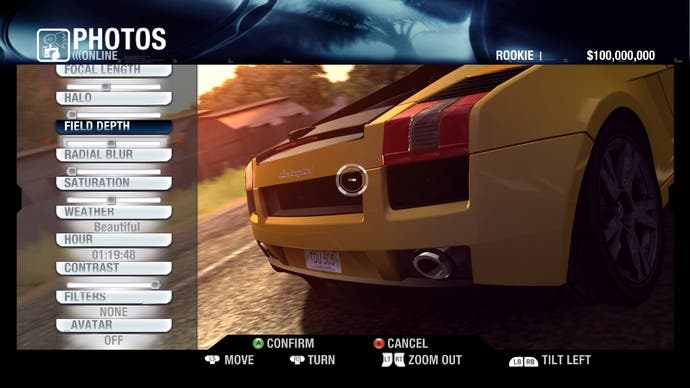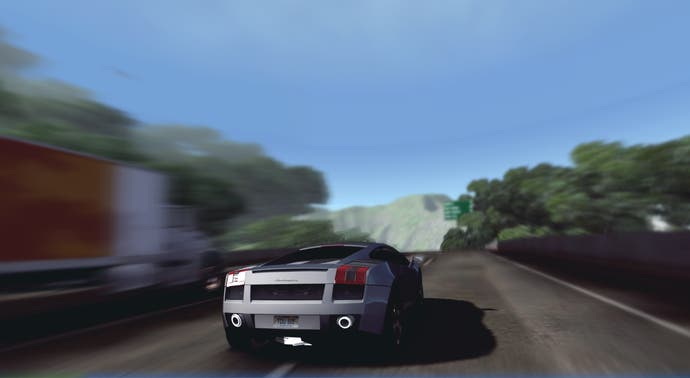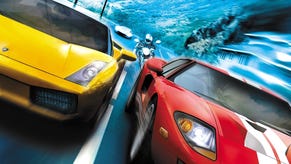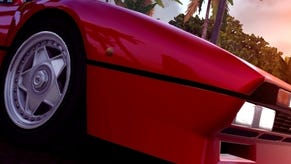Test Drive Unlimited
MOOR, MOOR, MOOR, how do we like it?
Grand Theft Auto is a genre, apparently. Or so Volition told us, explaining away the similarities between Saints Row and Rockstar's opus. We didn't really buy it. Rockstar actually found it funny. Over there this week on unrelated business, we mentioned this to a few of them and the reaction was a bit telling. "We're a genre now?"
Yes I'm doing this intro again - but with a twist! Because with Test Drive Unlimited, Atari claimed that Eden Studios had invented a new genre. The "Massively Open Online Racing" game. And we were sceptical as usual. But it turns out they were onto something, because virtually every tenet of the claim stands up.
In TDU, Eden has created a huge, open racing world that blurs the line between offline and online racing games. It's what Auto Assault might have been. It's not quite an MMO, but it's closer to that approach than the separated worlds of games like MotoGP and PGR. You could even get away with switching terminology - racing on your own against the AI and building up a stock of cash to invest in new equipment could be soloing, while its PvP is the combative encounters with racers you hunt down on the game's huge network of idyllic island highways.
In many senses it's the game that PGR3 should have been. By ripping out the guardrails and allowing you to cut your own path through a world that other racers are traversing at the same time, TDU overtakes Bizarre Creations in that sense. The question isn't whether this delivers on the "MOOR" hype - it does, and people will build on this idea in future - but whether it manages to deliver a racing experience of the same high standard.

Right from the start, you're connected to the game's online world. Having picked a character, bought a starter home with a four-car garage and rented something to drive around in, you're soon pootling down the streets of Oahu's southern-most town and exchanging glances with other beginners. The numbers are never overwhelming, thanks to the way the game pairs you with a sensible volume of similar players, which varies from area to area and obviously shifts in skill-level as you get further in, and there's lots of hapless traffic driving around to even things out. Watching other people career into it is quite amusing.
If you like, you can set right about racing the human opposition. As you move past them you can propose instant-challenges, and then race back and forward across prescribed or custom routes to find out which one of you read more of the instruction manual on the way home from the shop. But more likely you'll want to get some traction first by sampling the offline side of it. Or rather, the tasks that don't involve the other real-life players.
Finding things to do in TDU is very simple thanks to the ever-present GPS system. Like a mini-map, it appears in the bottom-left, and guides your course through races in a manner not unlike that of the Midnight Club games - although the shortcut-hunting element of MC is left out in favour of a game rooted more in pure-values racing. By hitting right on the d-pad, the GPS expands to fill the screen and you can zoom in and out of anywhere on the island.
The island's enormous, and there are a wealth of car clubs, dealers, homes, races, time trials and competitors to locate - in other words, a huge amount of icons. The game settles this by breaking them off into groups like key locations and other racers, which you can switch between intuitively using the left and right bumpers. Initially the GPS will alert you to tasks in your immediate location and a few further afield and focus on those that fit your current skill level. Selecting an icon with the analogue pointer allows you to see the classes involved, view the potential prize money and other entry conditions, and then set GPS coordinates so the mini-map will lead you to it.

In a welcome nod to accessibility, you're allowed to warp directly to locations you've already travelled through, cutting down on driving times. With tasks opening up in clusters in various locations fairly sensibly, initially at least it's a nice shortcut - and if a task is just off the beaten track you can find a beaten bit nearby and plant yourself there to shorten the distance.
Obviously there's a large variety of things to do, with checkpoints dotted on your GPS for point-to-point and lap-based races against AI cars, while a host of time-trial-oriented offerings have you delivering hitch-hikers to their destinations, or simply trying to get to a certain point within a time limit. You even get to drive models home with their shopping, as they touch themselves gingerly in the passenger seat and delicately caress your hand on the gearstick. Or so I imagine. As you complete races you build up cash, or credits you can spend in clothing stores, and so you set about building a fleet of high-end cars and decent portfolio of property.
Fairly standard, then, but what sells TDU isn't simply this blending of genres, of online and off - but also the brains that underpin the difficulty curve, and keep things interesting. With so much road to cover there's an obvious variety - with tight technical courses nesting with lengthy, high-speed runs that are more about maintaining speed and dodging traffic along endless beautiful highways than power-sliding. But the way the game squeezes you varies too, and this is more compelling.
You get a taste of it with the models, who will bail out if you go off the road so much that a small "driving" meter depletes, but more engaging examples come later in time-based checkpoint races that punish you with deductions. Ride your prancing pony over a few kerbs to shave times to gold standard and you may find the dressage-style time penalties have herded you into silver. It forces you to learn to drive steady as well as fast - and so manages to create boundaries without fencing you in the way PGR and other city-based racers do. The only slight shame is that it also doesn't allow you to build up appreciation the way PGR does - it'd be handy to be able to recoup some of that meter-depletion when you throw yourself into a difficult slide and handle it perfectly.






